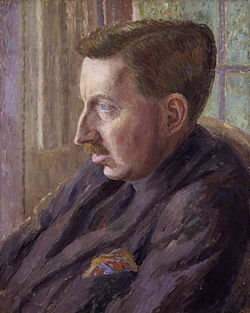E.M. Forster Quote
We come up against beauty here — for the first time in our enquiry: beauty at which a novelist should never aim though he fails if he does not achieve it. I will conduct beauty to her proper place later on. Meanwhile please accept her as part of a completed plot. She looks a little surprised at being there, but beauty ought to look a little surprised: it is the emotion that best suits her face, as Botticelli knew when he painted her risen from the waves, between the winds and the flowers. The beauty who does not look surprised, who accepts her position as her due—she reminds us too much of a prima donna.
E.M. Forster
We come up against beauty here — for the first time in our enquiry: beauty at which a novelist should never aim though he fails if he does not achieve it. I will conduct beauty to her proper place later on. Meanwhile please accept her as part of a completed plot. She looks a little surprised at being there, but beauty ought to look a little surprised: it is the emotion that best suits her face, as Botticelli knew when he painted her risen from the waves, between the winds and the flowers. The beauty who does not look surprised, who accepts her position as her due—she reminds us too much of a prima donna.
Related Quotes
About E.M. Forster
Edward Morgan Forster (1 January 1879 – 7 June 1970) was an English author. He is best known for his novels, particularly A Room with a View (1908), Howards End (1910) and A Passage to India (1924). He also wrote numerous short stories, essays, speeches and broadcasts, as well as a limited number of biographies and some pageant plays. His short story "The Machine Stops" (1909) is often viewed as the beginning of technological dystopian fiction. He also co-authored the opera Billy Budd (1951). Many of his novels examine class differences and hypocrisy. His views as a humanist are at the heart of his work.
Considered one of the most successful of the Edwardian era English novelists, he was nominated for the Nobel Prize in Literature in 22 separate years. He declined a knighthood in 1949, though he received the Order of Merit upon his 90th birthday. Forster was made a Member of the Order of the Companions of Honour in 1953, and in 1961 he was one of the first five authors named as a Companion of Literature by the Royal Society of Literature.
After attending Tonbridge School, Forster studied history and classics at King's College, Cambridge, where he met fellow future writers such as Lytton Strachey and Leonard Woolf. He then travelled throughout Europe before publishing his first novel, Where Angels Fear to Tread, in 1905. The last of his novels to be published, Maurice, is a tale of homosexual love in early 20th-century England. While completed in 1914, the novel was not published until 1971, the year after his death.
Many of his novels were posthumously adapted for cinema, including Merchant Ivory Productions of A Room with a View (1985), Maurice (1987) and Howards End (1992), critically acclaimed period dramas which featured lavish sets and esteemed British actors, including Helena Bonham Carter, Daniel Day-Lewis, Hugh Grant, Anthony Hopkins and Emma Thompson. Director David Lean filmed another well-received adaptation, A Passage to India, in 1984.
Considered one of the most successful of the Edwardian era English novelists, he was nominated for the Nobel Prize in Literature in 22 separate years. He declined a knighthood in 1949, though he received the Order of Merit upon his 90th birthday. Forster was made a Member of the Order of the Companions of Honour in 1953, and in 1961 he was one of the first five authors named as a Companion of Literature by the Royal Society of Literature.
After attending Tonbridge School, Forster studied history and classics at King's College, Cambridge, where he met fellow future writers such as Lytton Strachey and Leonard Woolf. He then travelled throughout Europe before publishing his first novel, Where Angels Fear to Tread, in 1905. The last of his novels to be published, Maurice, is a tale of homosexual love in early 20th-century England. While completed in 1914, the novel was not published until 1971, the year after his death.
Many of his novels were posthumously adapted for cinema, including Merchant Ivory Productions of A Room with a View (1985), Maurice (1987) and Howards End (1992), critically acclaimed period dramas which featured lavish sets and esteemed British actors, including Helena Bonham Carter, Daniel Day-Lewis, Hugh Grant, Anthony Hopkins and Emma Thompson. Director David Lean filmed another well-received adaptation, A Passage to India, in 1984.
